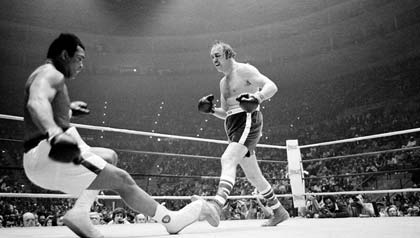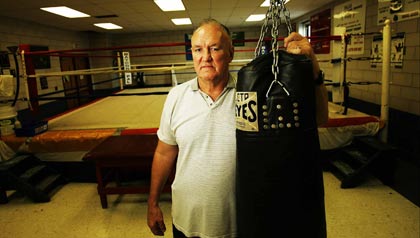Boxer Chuck Wepner Decked Muhammad Ali
The fighter who inspired Rocky

AP Photo
The butterfly Muhammad Ali goes down in the ninth round of the heavyweight title bout against challenger Chuck Wepner. In the 15th round, the bee Ali knocks out Wepner to retain his title.
It's called a "puncher's chance." A fighter with powerful fists, no matter how outclassed he might be against a faster boxer with more endurance, can always — with good luck and perfect timing — win by a knockout.
And in the ninth round on the evening of March 24, 1975, Chuck Wepner believed he was about to be crowned heavyweight champion of the world.

David Howells/Corbis
Sylvester Stallone's inspiration for Rocky, Chuck Wepner is one of the few fighters to knock down Ali.
He also made the boxing team, and was heavyweight champion of the Marine air base at Cherry Point, N.C. When he was discharged in 1959, he returned to Bayonne, where he already had a wife and two children.
Fighting in his spare time, Wepner was a security guard, then a bouncer, and for the past 41 years he's been a full-time salesman for Allied Liquor. In 1978, three years after fighting Ali, he retired with 35 wins (17 by knockout), 14 losses and two draws.
He won the 1965 New York Golden Gloves heavyweight championship, then turned pro. On June 29, 1970, he faced former heavyweight champion Sonny Liston. After nine rounds Wepner was virtually unrecognizable.
"Barney Felix, the referee, he wanted to stop it. He told me, 'Chuck, you're all busted up,' " Wepner said. "I said, 'Barney, let me finish the fight. I'm OK,' and he said, 'How many fingers do I have up?' I couldn't see, but Braverman had his hand on my shoulder and he tapped me three times. I said, 'Three,' and Barney said, 'OK, you can come out.' "
He didn't. The ring doctor stepped in, took one look and stopped the fight. Wepner wound up with broken ribs, a broken nose, eye socket and cheekbone, 72 stitches, and an enduring nickname.
Rosie Rosenberg, editor of the Jersey Journal daily newspaper, had been at ringside. "He had on this beige suit," Wepner said, "and every time Liston landed a punch, blood would splatter and it got all over his suit." Rosenberg's story the next day said Liston had beaten the Bayonne Bleeder.
Beginning the following year, 1971, Wepner was listed among the top 10 heavyweights for 42 straight months. He was ranked eighth when he fought Ali.
"Don King had sent me out to Salt Lake City to fight a guy named Terry Hinke," Wepner said. "If I beat him I was supposed to fight George Foreman."
Wepner stopped Hinke in the 11th round. Three weeks later, in the "Rumble in the Jungle" in Zaire, Ali rope-a-doped Foreman and won back the heavyweight crown.
"I figured my chance was over," Wepner said, "but Don King called me and said, 'I promised you a shot at the title. You're gonna be fighting Muhammad Ali.' He said he'd told Ali, 'Wepner'll be like a tune-up. He cuts easy.' "
Angelo Dundee, considered one of boxing's greatest trainers and Ali's perennial cornerman, said, "Nothing's a tune-up in boxing. Stories that King was looking for someone to prepare Muhammad for his next fight? Baloney. Chuck got the fight because he deserved it."
Allied Liquors gave Wepner seven weeks off. For the first time he could actually train full time for a fight. He received $100,000, far more than for any other fight. Ali got $1.5 million.
Whether Ali was knocked down in the ninth round — that's what Perez, the referee, ruled — is debatable. Ali claimed after the fight that he fell because Wepner was standing on his right foot when he was backing away. A photo of the moment appears to confirm it.
Wepner begs to differ. "In a fight, if somebody steps on your foot and knocks you down, you jump up and start screaming. Ali never did that. He took the eight count."
Still, he has a framed photo of a young Ali, sent to Wepner when he married Linda. Ali's inscription reads: "To Chuck and Linda: Good luck to my dear friends. Love, Muhammad Ali. After me, there will never be another. (Get off my foot)."
A few days before the bout, Wepner bought a powder-blue negligee for his then-second wife, Phyllis. "As I left the hotel the night of the fight I told her, 'I want you to wear this to bed because tonight you're going to be sleeping with the heavyweight champion of the world,' " Wepner said.
"After the fight I come back to the hotel and walk into the room and she's sitting on the edge of the bed, wearing the negligee, and she says, 'Am I going to Ali's room or is he coming to mine?' "
Bruce Lowitt, a freelance writer living in the Tampa Bay area, is a former sports features writer for the Associated Press and the St. Petersburg Times.
